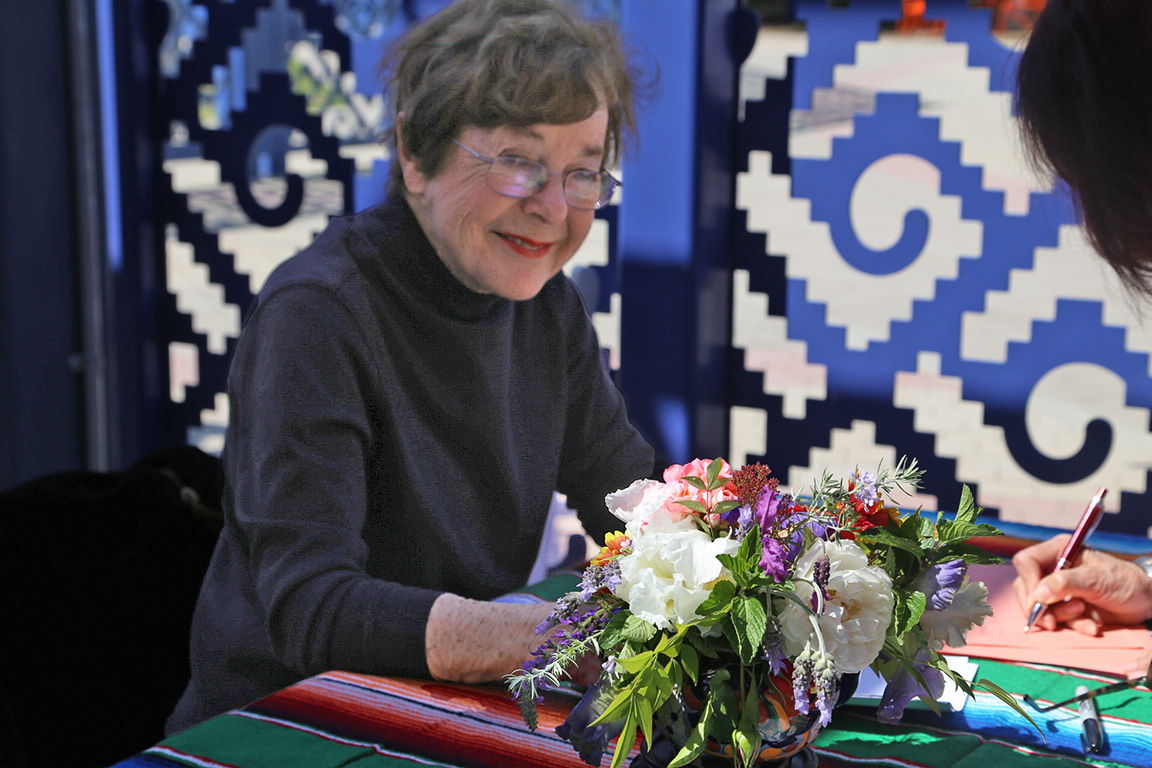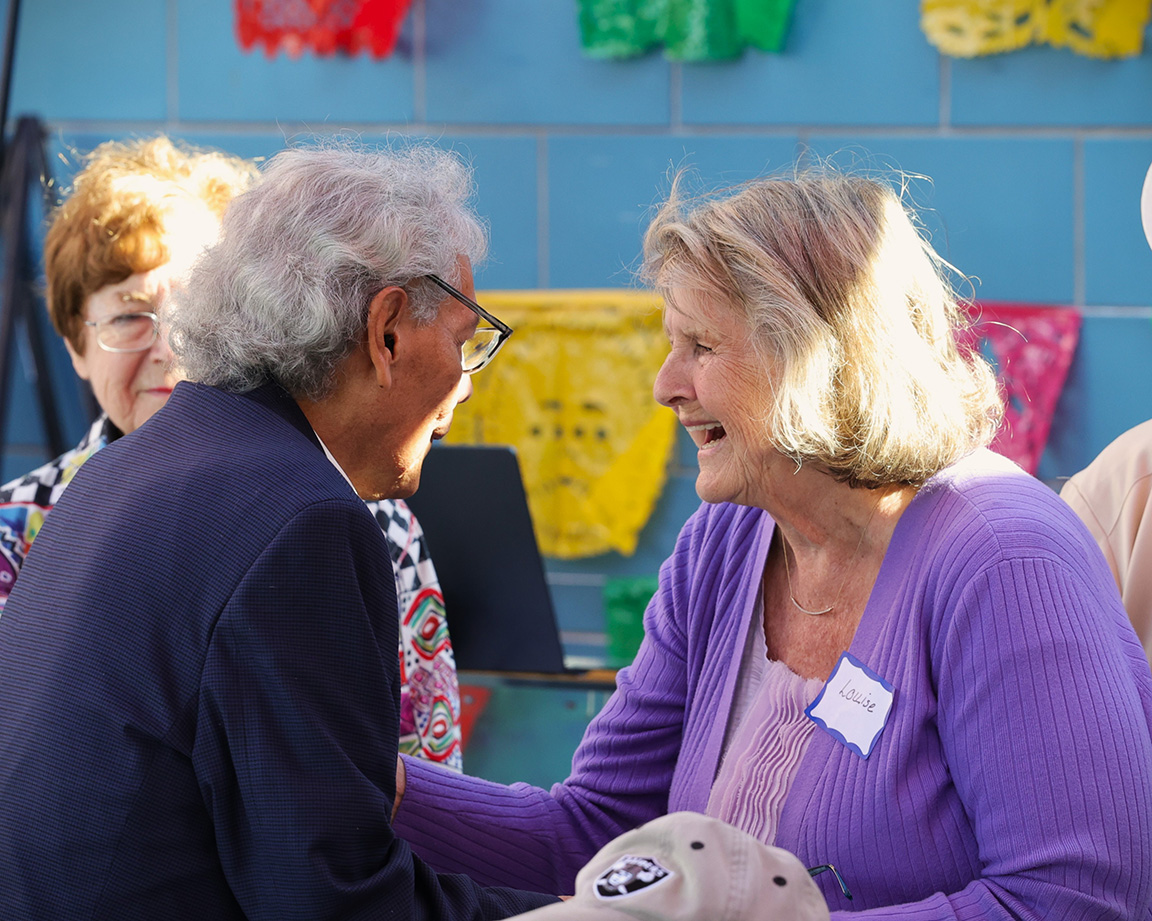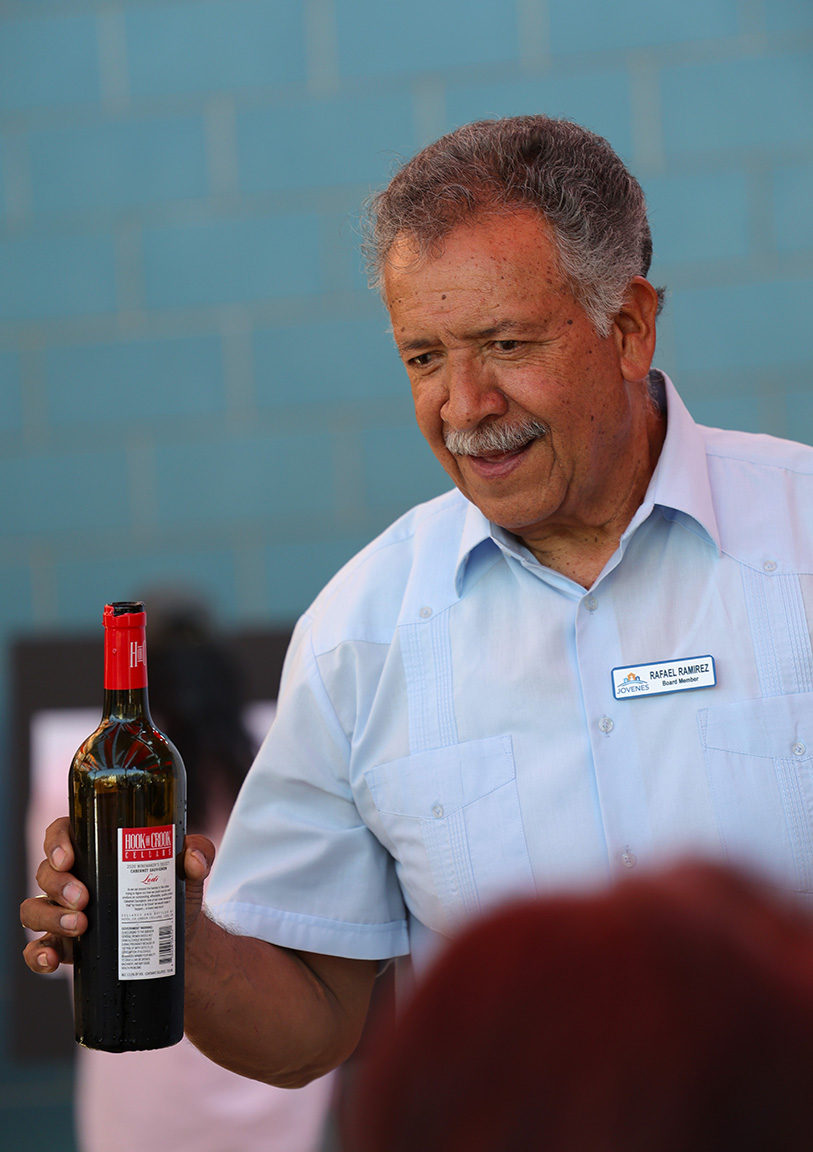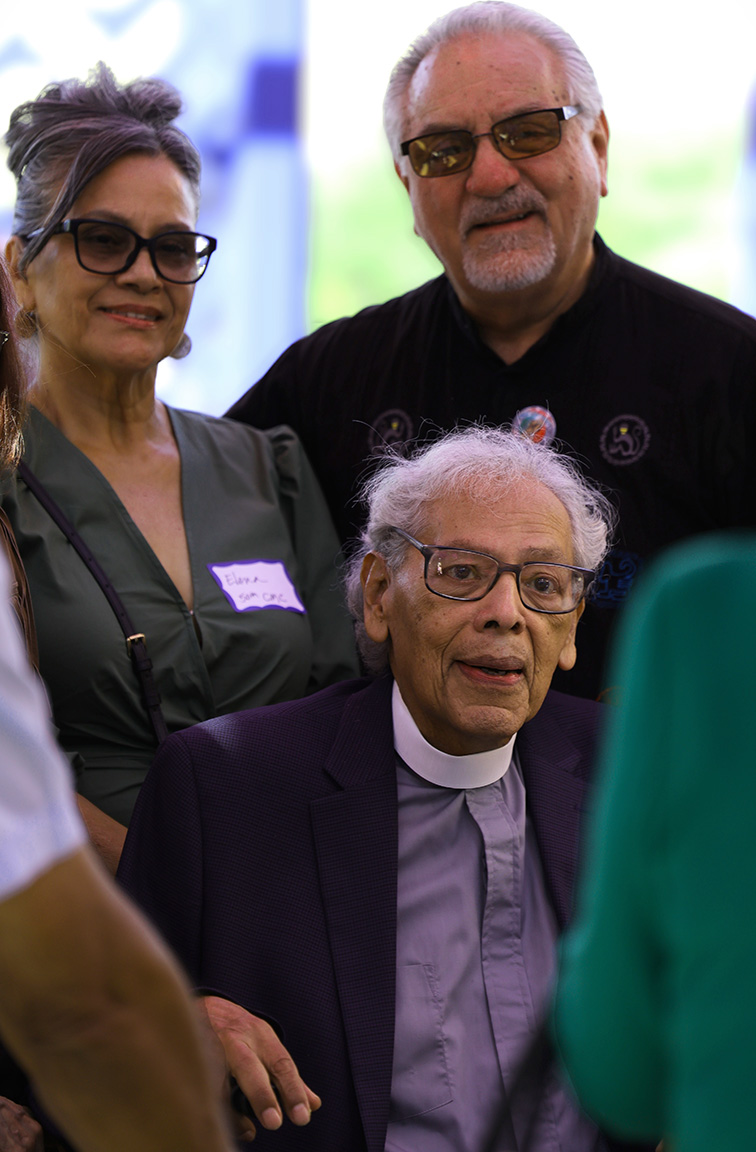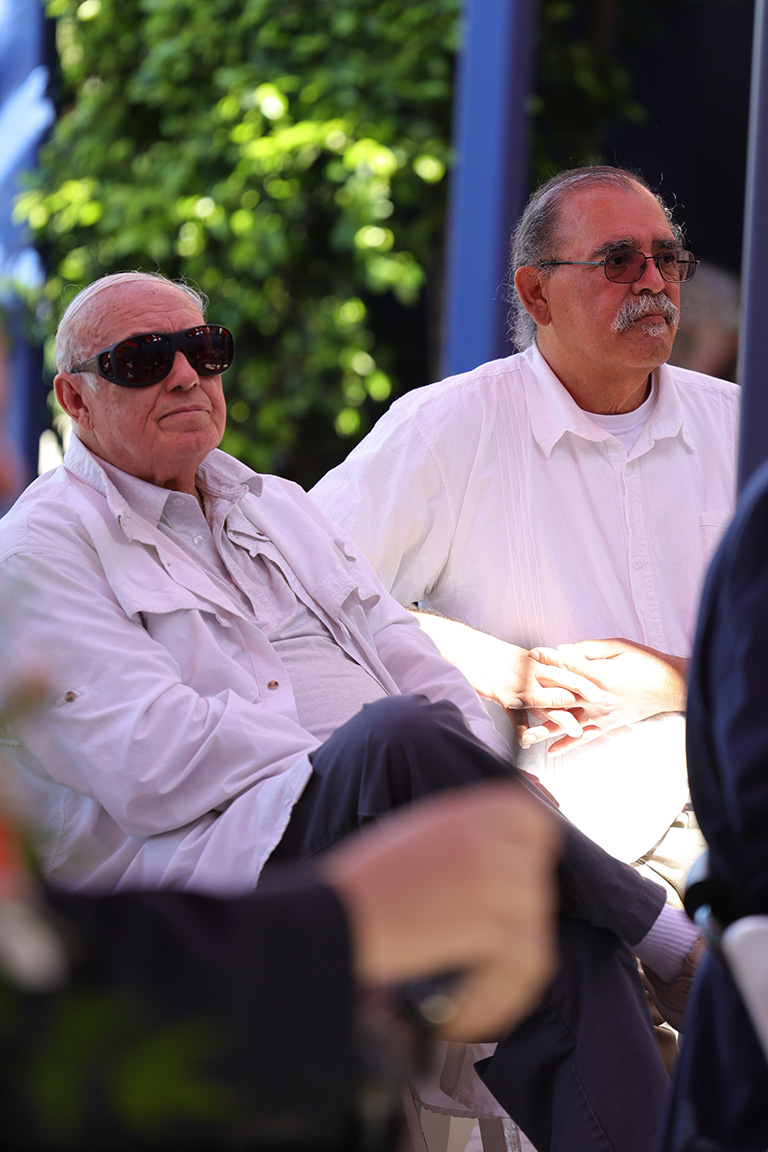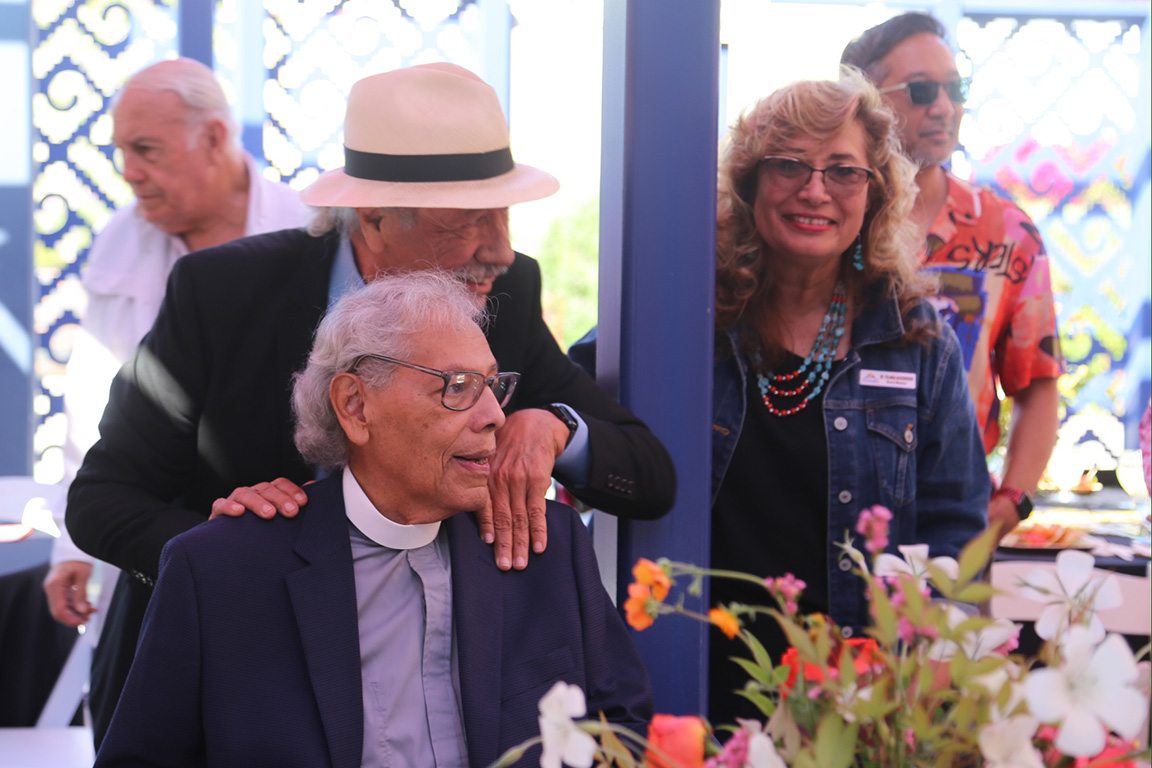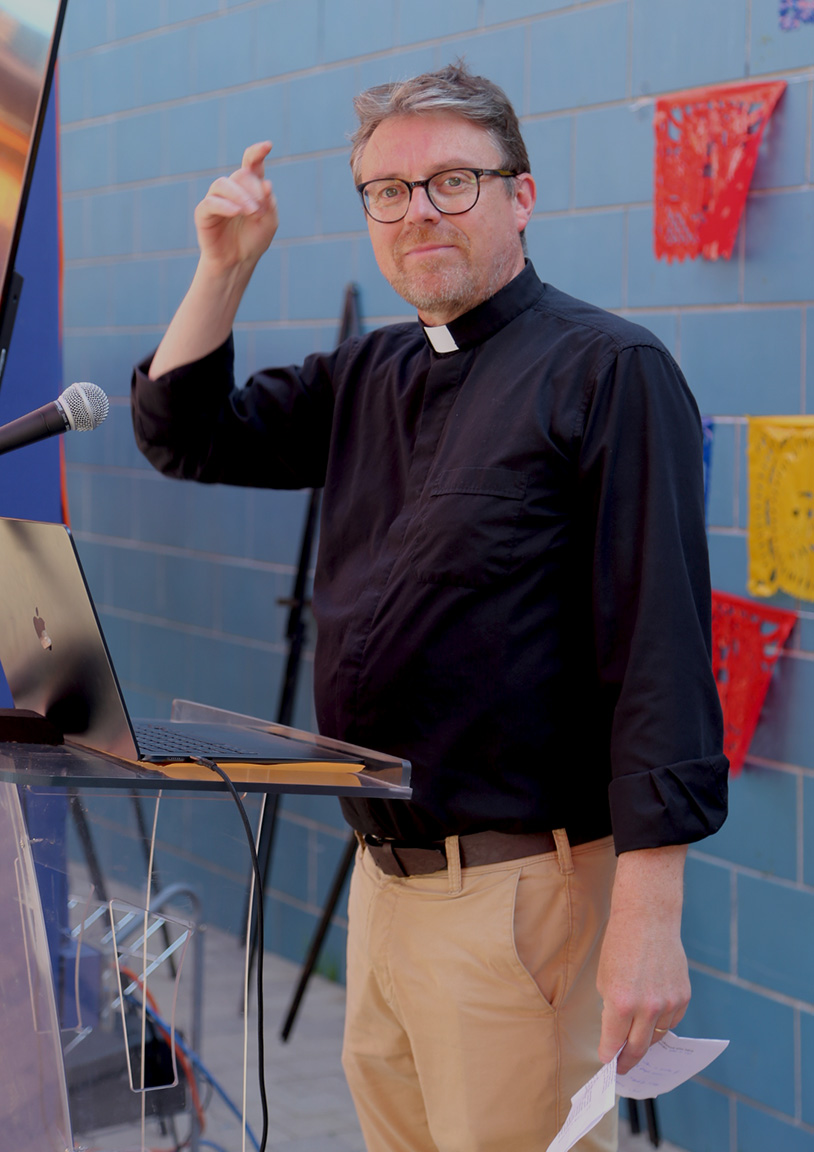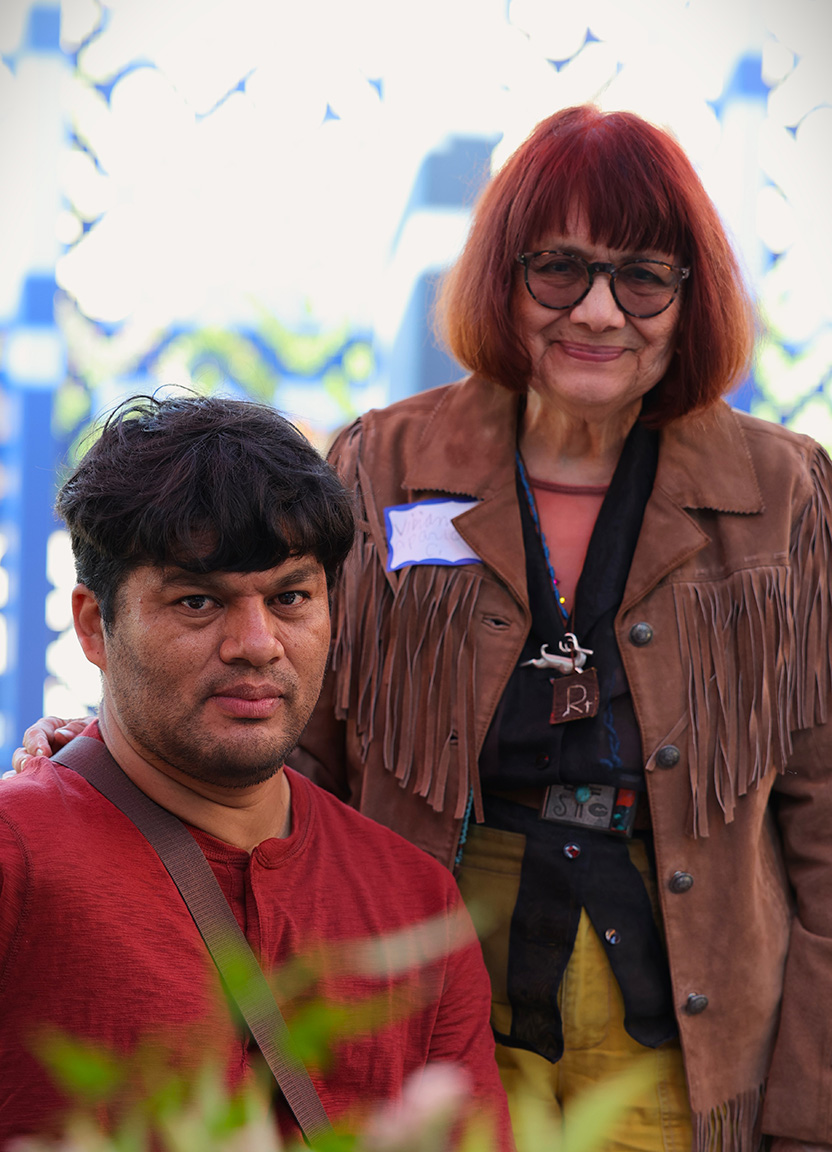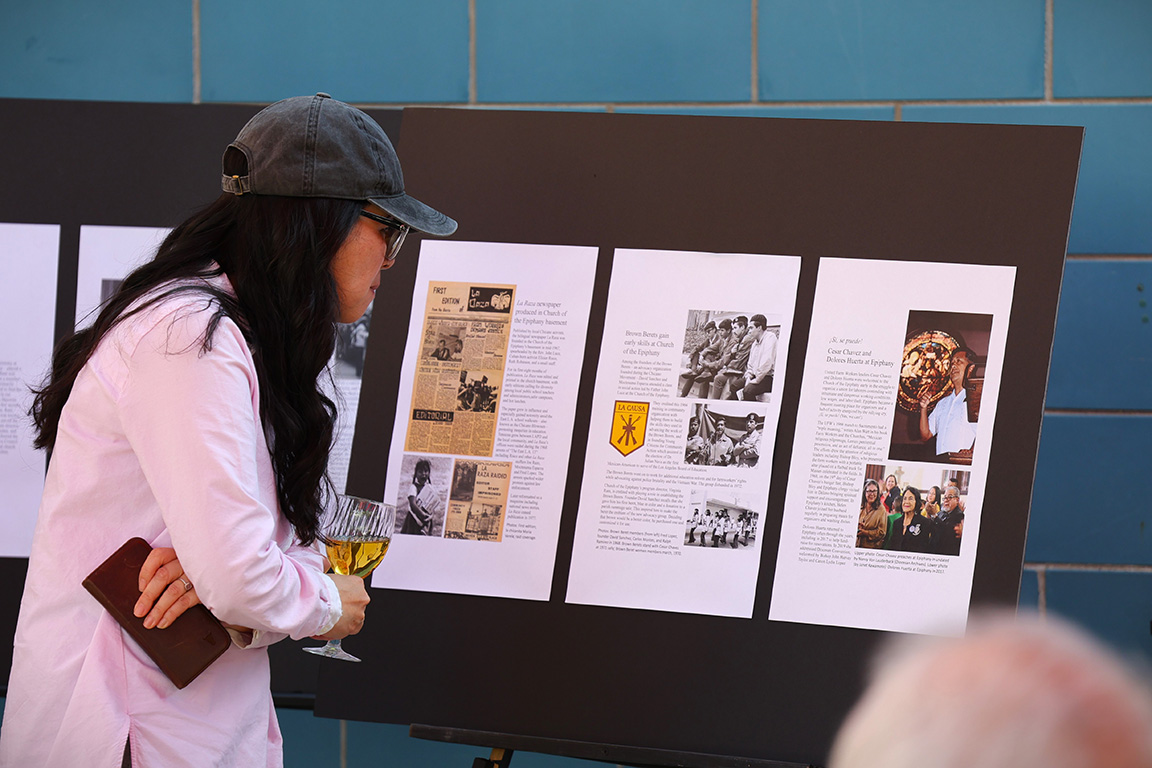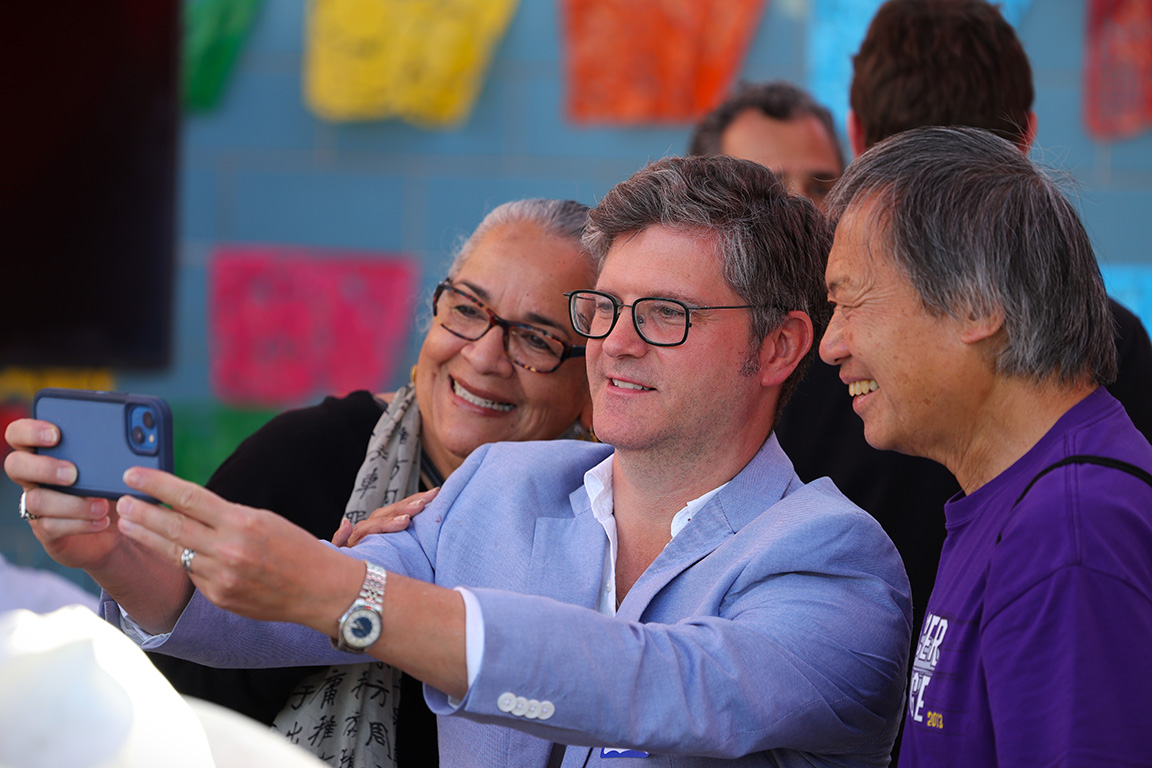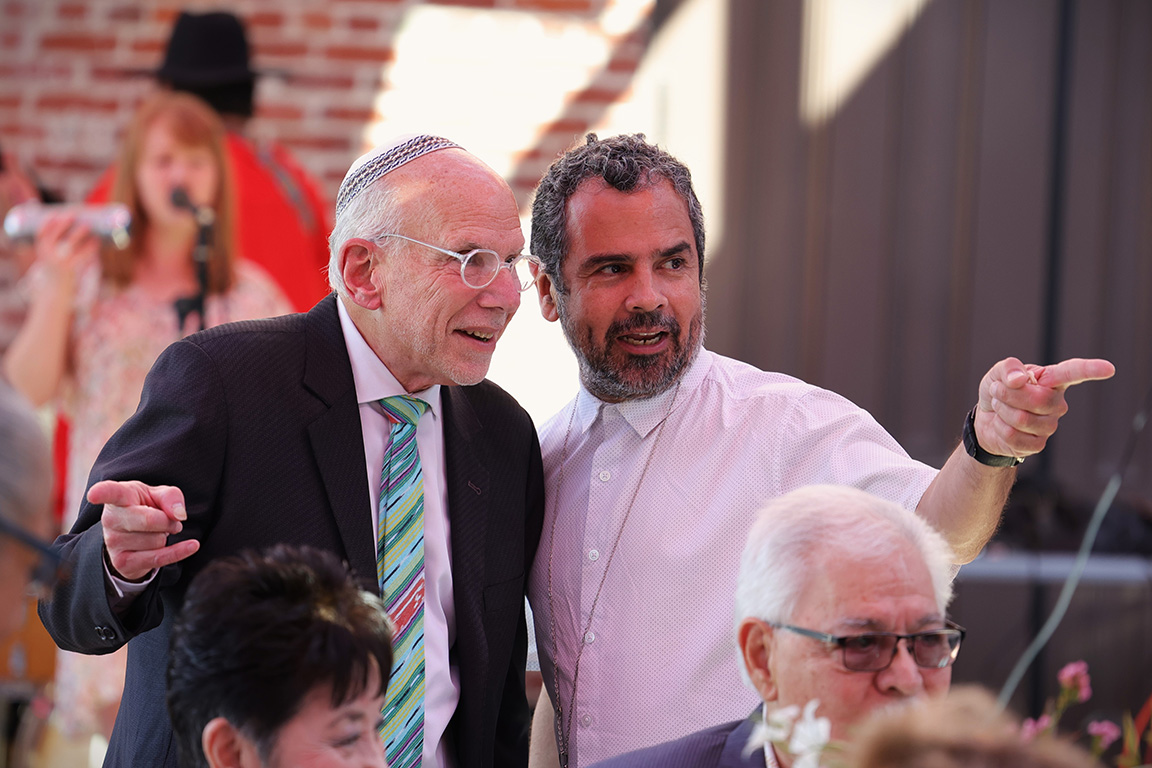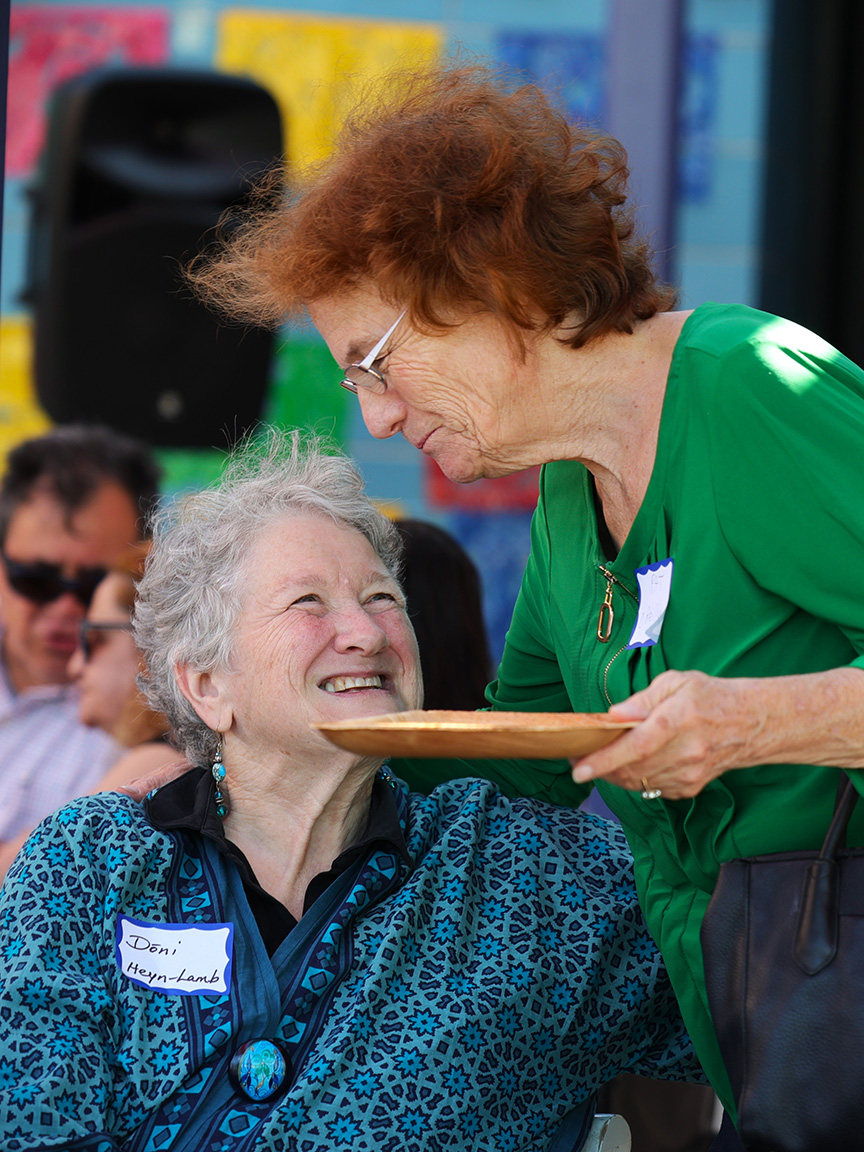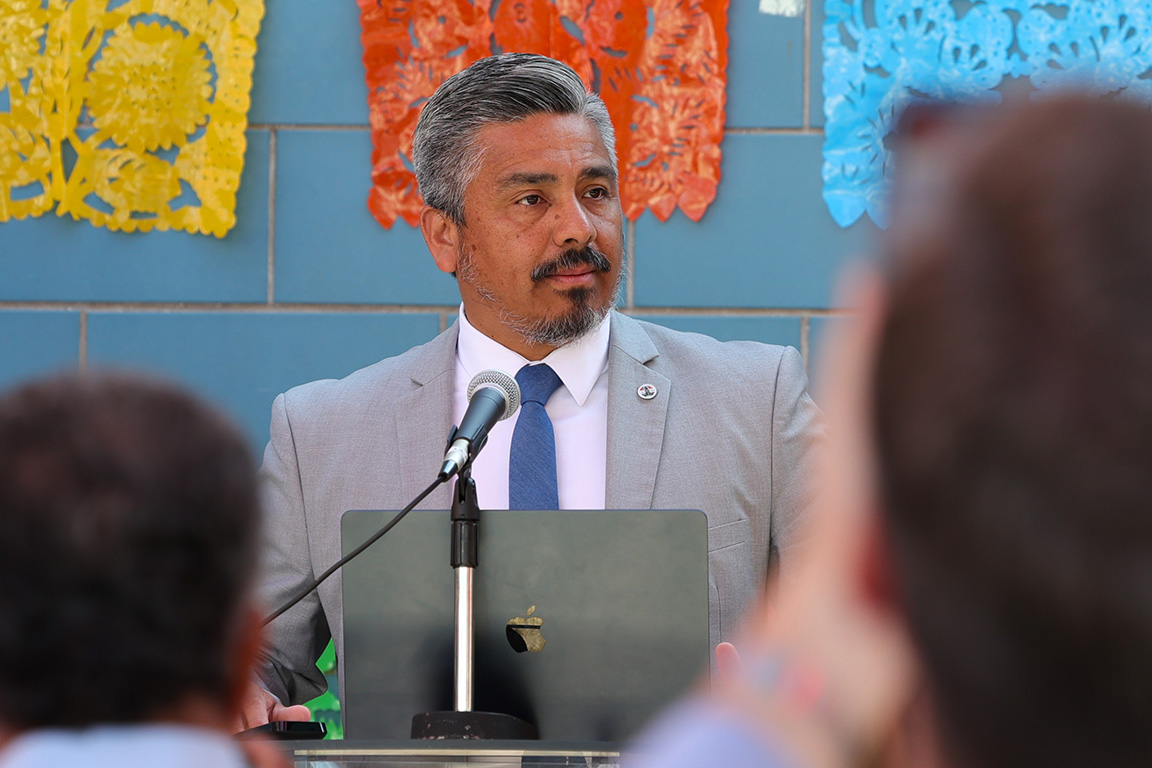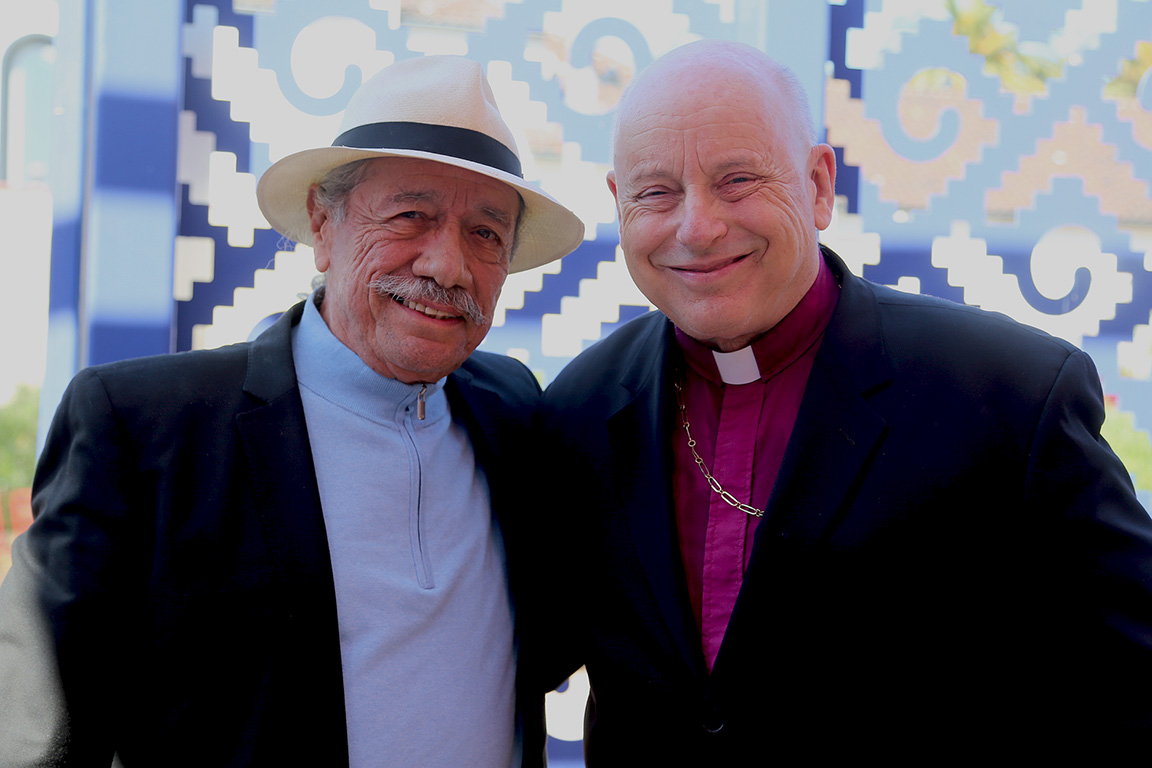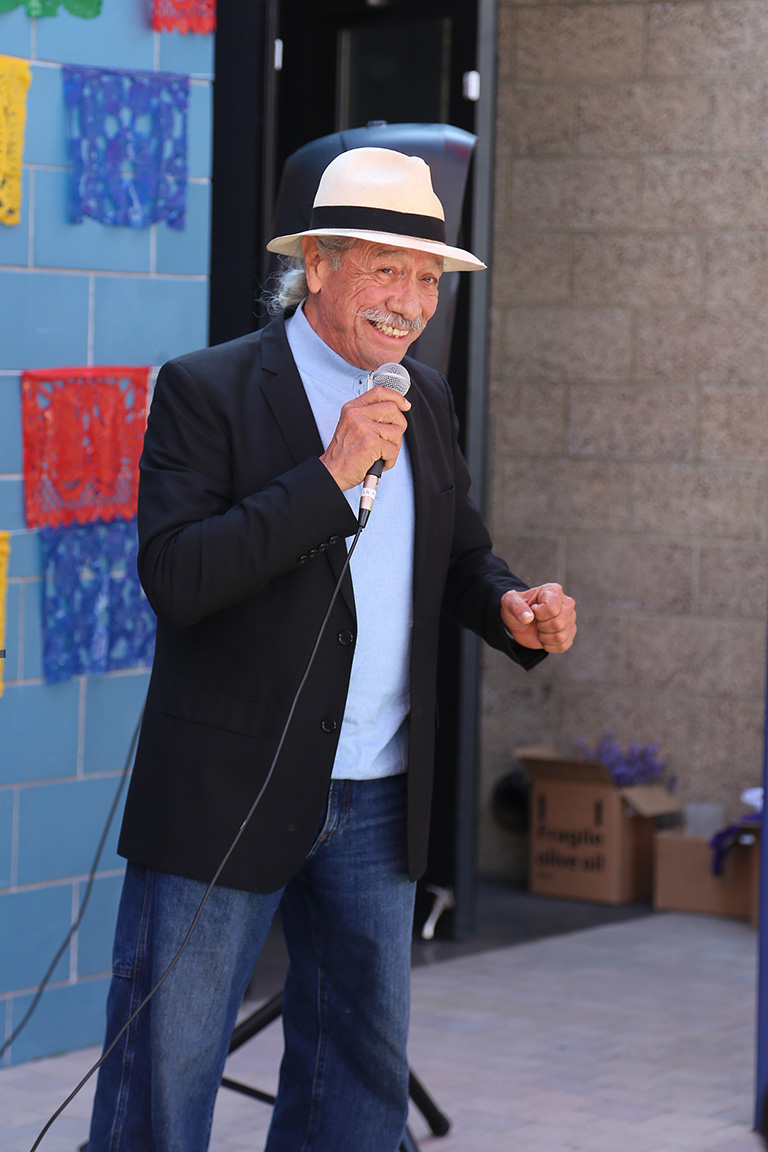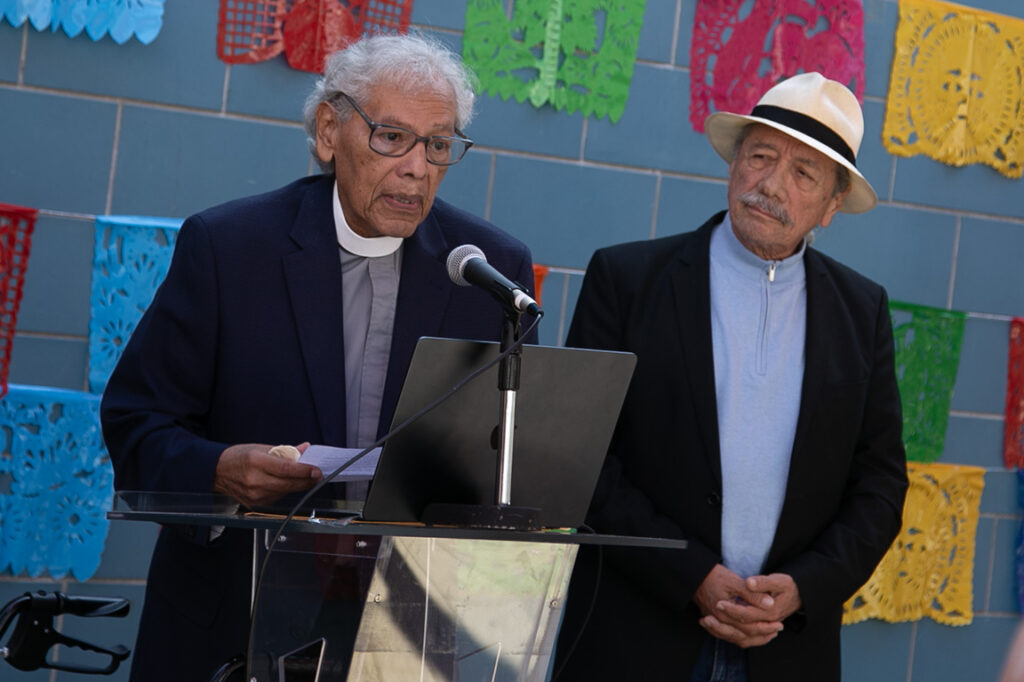
Richard Estrada, assisting priest at Church of the Epiphany, Los Angeles, accompanied by actor-activist Edward James Olmos, speaks at the launch of the Lydia Lopez Center for Community Empowerment. Photo: Janet Kawamoto
[The Episcopal News] A summer youth program and an immigrant welcome center will expand in coming weeks through the new Lydia Lopez Center for Community Empowerment, launched April 21 with a fiesta benefit that raised more than $102,000 in support.
Bishop John Harvey Taylor opened the festivities by greeting attendees including actor Edward James Olmos and Antonio Chapa, district director in the office of County Supervisor Hilda Solis who has provided a $15,000 grant to the center based at East L.A.’s historic Church of the Epiphany, a hub of civil rights organizing since the 1960s.
“As Lydia would have it, we begin with resistance to an unjust status quo,” Taylor said of the new center envisioned by the Rev. Richard Estrada, an Episcopal priest known for his advocacy, shared by Lopez, in the sanctuary movement.
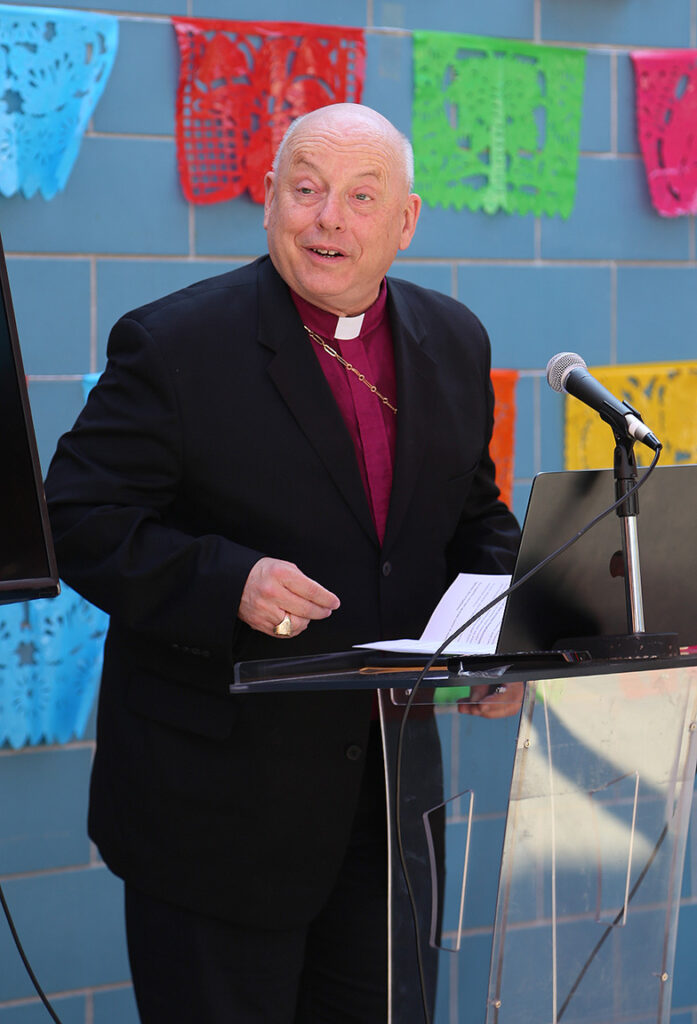
Bishop John Harvey Taylor speaks at the launch fiesta on April 21. Photo: Janet Kawamoto
Estrada, 82 and a former pastor of L.A.’s landmark La Placita Roman Catholic Church and founder of Jovenes Inc., followed Taylor at the podium. “The plight of immigrants is a pressing concern that challenges the principles of justice and compassion fundamental to our faith,” Estrada said. “Despite adversities, our immigrant brothers and sisters have integrated into our society, enriching our communities and contributing significantly to the common good. However, the human impact of immigration policies, particularly the separation of families and the uncertainties many face, threatens the cohesion of our communities.”
Estrada’s comments built on Taylor’s observation that “the greatest sin of our civic life in the United States is that when it comes to immigrants and immigrant workers, we have forsaken the language of human dignity in our discourse. Our political debates on this issue have been curdled by the sour antidemocratic vocabulary of scapegoating and hate,” Taylor said, drawing applause from among the 65 supporters gathered on the patio of La Plaza de Culturas y Artes, next door to La Placita Church in the city’s El Pueblo Historical Monument district.
The Lydia Lopez Center begins “with the dignity of every human being,” Taylor added, speaking in English and Spanish, “with universal human rights, with a vision of the United States as a place of welcome, hospitality, and renewal – a society at last within sight of its destiny as the greatest pluralistic democracy on earth.”
Olmos – who, among numerous credits, was Oscar-nominated for his role as East L.A. teacher Jaime Escalante in the 1988 movie Stand and Deliver and produced the HBO film Walkout about the 1968 Chicano Blowouts at local high schools – praised Lopez and Estrada as leaders “who only understand a sense of who they are, but they make everyone else understand who they are.
“The Lydia Lopez Community Empowerment Center; what a brilliant idea! Why? Because that’s all she did was empower us,” Olmos said. “Every time I turned around, she’d go, ‘Ed, c’mon, come over here.’”
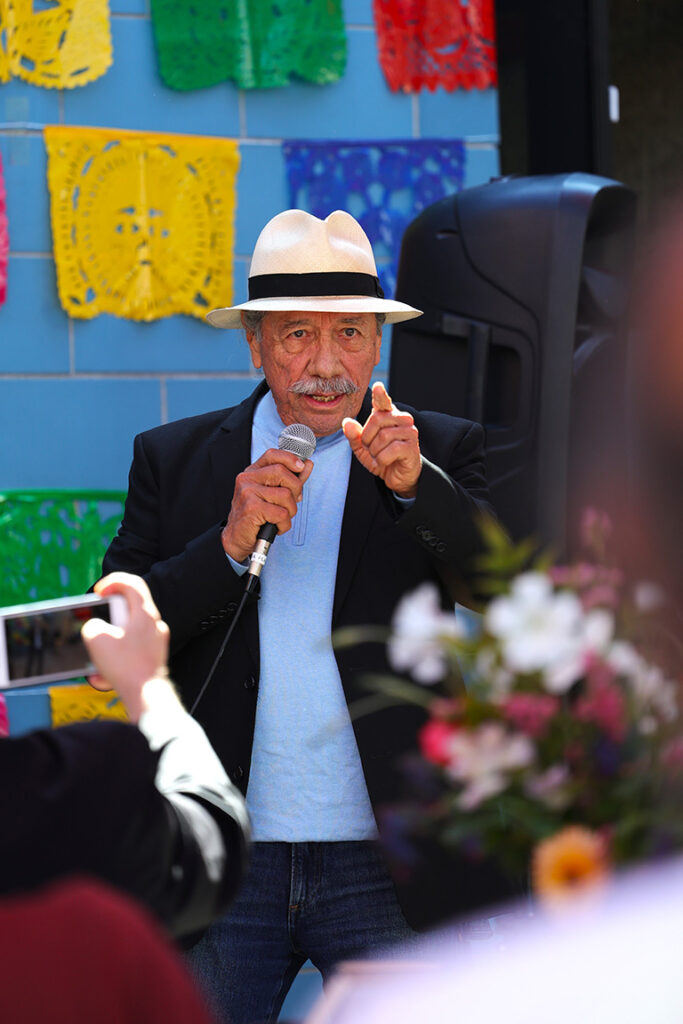
Actor-activist Edward James Olmos shared his memories of Canon Lydia Lopez and her life of activism and advocacy. Photo: Tom Watson
Also well known for his TV roles from Lieutenant Marty Castillo in Miami Vice to U.S. Supreme Court Justice Roberto Mendoza in The West Wing, Olmos spoke of his Roman Catholic faith and the importance of interfaith understanding, praising “the whole Episcopalian situation.”
Thanking donors and encouraging them to continue giving, he pointed again to Lopez’s role as an advocate and organizer. “Lydia was truly a person who had a tremendous amount of dignity, integrity, commitment to understanding herself to the point that makes others understand themselves,” Olmos said. “That is something that is so pure, and she always spoke very, very well. She was a fighter… she got arrested many times, she and her husband, Fred, one of the leaders of the Brown Berets.”
Taylor recounted more aspects of Lopez’s activism. “Lydia struggled for Chicano and farmworker rights and against the Vietnam War – she marched with Dolores Huerta and Cesar Chavez and other giants of justice.
“As president of the United Neighborhoods Organization, she partnered with actor Dennis Weaver to battle food insecurity; she lobbied hard to make sure L.A. Metro lines would serve working people by actually stopping in their neighborhoods; she battled insurance redlining that hurt Hispanic neighborhoods,” Taylor said.
“In our diocese she helped form two generations of deacons and priests for ordained ministry” as a long-time member of the Commission on Ministry.
Scholar and author Felipe Hinojosa of Baylor University – author of the 2021 book Apostles of Change: Latino Radical Politics, Church Occupations, and the Fight to Save the Barrio, who now is writing a biography of Lopez – traced her life story starting with her birth in 1942 in East L.A. to Mexican immigrant parents active in the Baptist church, and her entry as a young adult into the Chicano movement.
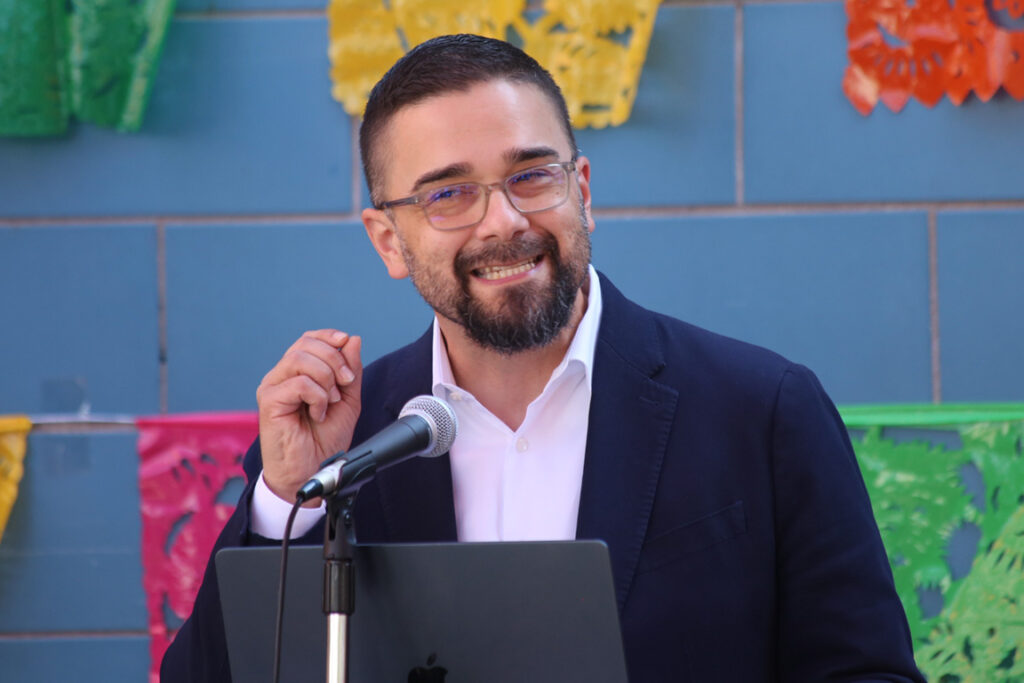
Felipe Hinojosa of Baylor University, who is writing a book about Lopez, outlines her life story. Photo: Janet Kawamoto
“Her world evolved from there, and political consciousness continued to grow,” Hinojosa said. “She served on a county grand jury in 1971, she became the first Latina elected to the conference of the Episcopal Church, and she earned her reputation – and these are her words – as a ‘pushy broad.’
“When I think about the impact that she’s made, the lives that she’s touched, the many smiles that she shared and the joy that she carried with her …. everything about her … was tied to her sense of community and to her faith,” he added. “What is really unique about Lydia is that her life spans the narrative arc that takes us from the Chicano movement in Los Angeles to her welfare rights work in the 1970s – doing this work, by the way, as a single mom – from there to top leadership in the United Neighborhoods Organization, to her love and enduring friendship with Fr. Luis Olivares and their collaborative work in building the sanctuary movement in Los Angeles, and from there to a lifelong love of service. She never stopped organizing, she never stopped moving, she was always working on something.”
In 2002, then-Bishop J. Jon Bruno named Lopez to the staff of the Episcopal Diocese of Los Angeles as associate for communications and public affairs. Her portfolio ranged from healthcare reform to companion-diocese relationships based in Mexico City and Jerusalem. In the course of this work, she mobilized friends and colleagues, many of whom helped organize the April 21 fiesta, held a day after what would have been her 82nd birthday.
Among these is Grace Dyrness, urban development organizer and retired USC professor and urban organizer, whom Taylor thanked for expertly chairing the fiesta arrangements committee and fundraising initiative. “It is a privilege and a joy to do this work of honoring Lydia by serving others,” Dyrness says of the new center.
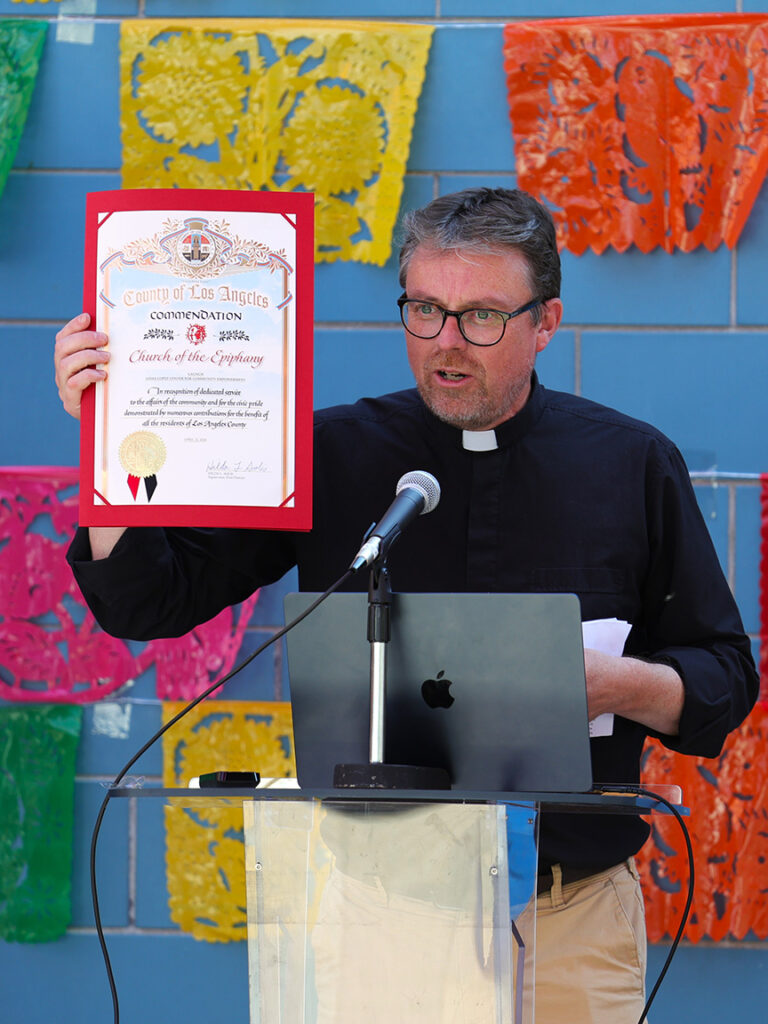
John Watson, vicar of Church of the Epiphany, displays a citation from the County of Los Angeles and Supervisor Hilda Solis. Photo: Tom Watson
Emcee of the fiesta program was the Rev. John Watson – recently arrived priest-in-charge of both Epiphany and St. Athanasius congregations – who, the bishop said, has “taken to his ministry… like St. Peter’s fish in the Sea of Gailiee.”
Thanking donors and fiesta attendees, Watson – whose accomplished, fully bilingual ministry in the U.K. included founding and pastoring a Latino congregation – underscored the importance of welcome in a new land.
“When you have to leave home … and begin a new place where everything is very different, to seeing smiling faces and offers of opportunity of support of help is so important,” Watson said, “especially when you feel yourself as a community that has been underrepresented or even abused… this moment of welcome is such an important thing.
“We want to give access to community resources, working in partnership with a number of organizations … particularly with CLUE and IRIS … that would be keen to give people access … housing, nutrition, medical advice, counseling and employment,” Watson said. “We want to help people access youth resources including scholarships and tuition, tutoring and recreation activities, as well as supporting college applications and placements. We want to help people access cultural resources which include celebration of their own arts and language and music and local history, this is our hope and our dream.”
Bishop Taylor, in his remarks, noted how swiftly plans for the center came together, inspired by Estrada’s vision and celebrated with a Jan. 6 Feast of the Epiphany celebration and immigration forum at the church. After early conversations individually with Estrada, the bishop joined a “blue-sky” conversation and planning meeting with Estrada and colleagues last year.
“Because the Church of the Epiphany was a linchpin of a whole justice movement and a place Lydia loved dearly, a small group gathered at the church beginning in the spring and summer of 2023. This is all in the wake of Fr. Tom Carey’s and the church’s magnificent restoration campaign,” Taylor said. “Fr. Richard and his brain trust sat down and resolved to twin Lydia and Epiphany as pillars of the parish’s ongoing renaissance and a permanent institutional commitment to the values to which she dedicated her life.”
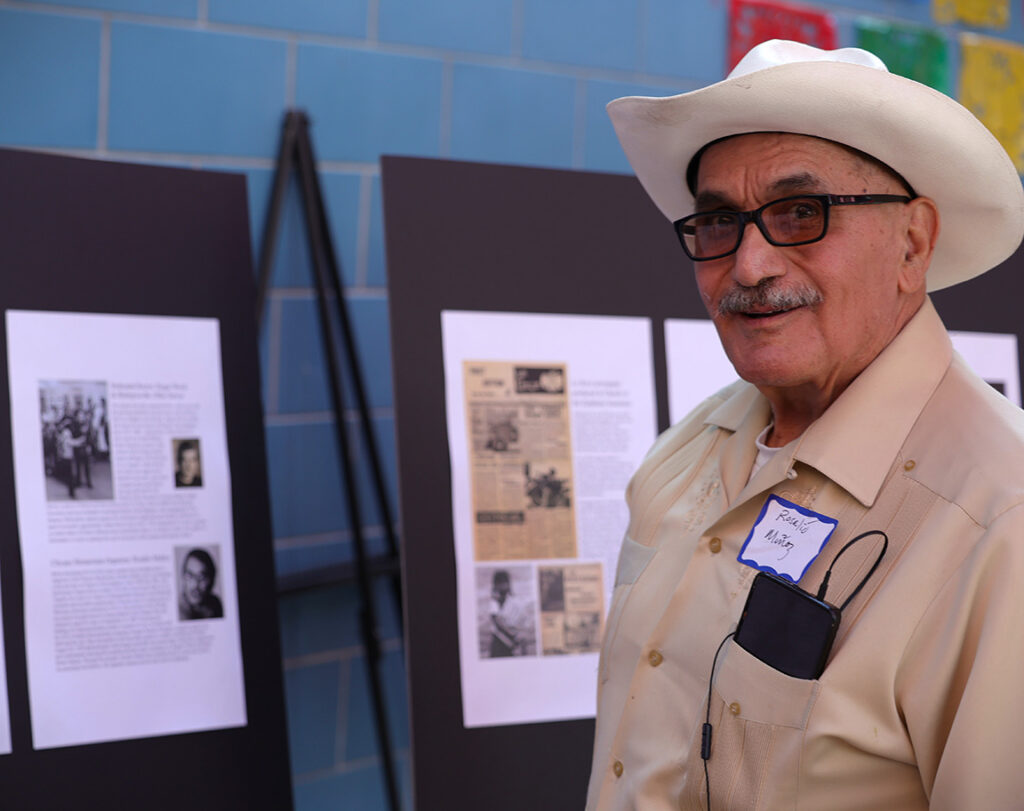
Veteran Chicano activist Rosalio Munoz, involved at Church of the Epiphany since boyhood, stands near history panel picturing him as a young adult. Photo: Tom Watson
In this process, an advisory committee, now led by Watson, is forming and includes Lopez’s niece EvaMarie Morris, an Orange County college professor. The committee will help the new center build upon the work of the Epiphany Conservation Trust, which has assisted in repairs and preservation of the historic church buildings.
Tracing the Church of the Epiphany’s 138-history is also among initiatives of the new center, assisted by advisory committee member Josh Garrett-Davis, Epiphany parishioner and author-historian, who in 2023 was named the H. Russell Smith Foundation Curator of Western American History at San Marino’s Huntington Library, Art Gallery, and Botanical Gardens.
On display at the fiesta were beginning storyboards for a portable exhibit highlighting Epiphany history and prepared through the diocesan archives. The panels feature brief profiles of key activists, including Chicano Moratorium Committee founder Rosalio Muñoz, a Cub Scout at Church of the Epiphany in his boyhood, who was present at the fiesta.
Highlights of the celebratory fiesta included live music by the Northwest L.A. Jazz band directed by Epiphany parishioner David Holguin, and tasty Latin American fare catered through arrangements by advisory committee member Josh Lopez-Reyes, founder of the Echo Park Immigration Center.
The importance of the new center’s work was summed up in the invocation offered by Estrada: “Oh God, creator of life and everything that is, we come before you today to seek your presence in our midst. We give you thanks for our immigrant sisters and brothers, many of whom endure peril and hardship on their journeys here. As Jesus did among the disenfranchised, help us to provide safety, opportunity, and true belonging for those in need. We pray for decision-makers in positions of power, that they may act with justice and compassion and together with us, serve as instruments of your love and mercy in the world. Through Jesus Christ, our Lord. Amen.”
— Bob Williams serves the Diocese of Los Angeles as canon for common life and historian-archivist. He is a member of the Lydia Lopez Center advisory board.
